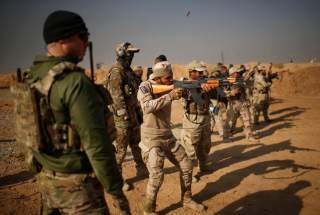How to Win an Asymmetric War in the Era of Special Forces
U.S. Army special operations forces should be the force of choice to lead these efforts against adversaries that deliberately avoid America’s conventional strengths.
Promoting the U.S. Option
Planners may consider Army special operations security cooperation and capacity-building activities as a form of “out-bidding” that promotes the United States as the more advantageous partner of choice. For example, China’s infamous no-strings approach to partner governments, once viewed as a welcome alternative to burdensome human-rights and anticorruption measures required by the United States, is beginning to lose appeal in light of eroding national sovereignty. Demonstrated through successful counterterrorism operations from Iraq to the Philippines, Army special operations forces bring professionalism and credibility to partner nation engagements, an attraction that competitors cannot rival. These activities play a crucial role in opening space for interagency engagement to strengthen U.S. influence at the expense of competitors, and ultimately place the United States in a position of relative strategic advantage.
Reducing Friction in Proxy Warfare
An easily overlooked rule of proxy warfare is that potential partners will fight for their interests first, not the sponsor’s. When choosing to employ proxies, decisionmakers require the ability to persuade them to better align their objectives with those of the United States. Army special operations skillsets are critical to mitigating this friction in sponsor-proxy relationships. First and foremost, Army special operations forces’ ability to identify and understand human networks allows the United States to better determine initial goal alignment with a proxy and assess its true capabilities and points of leverage. Second, Army special operations forces provide conduits to influence goal alignment, even if only in the short-term. These include organizational aid and leadership cultivation; military training; embedded advisors; inspiration; and financial, material, and intelligence support. Depending on the degree of provision, these mechanisms can both demonstrate the United States’ resolve against adversaries and increase the likelihood of successful proxy employment.
Prevailing Today, and Setting Conditions for Tomorrow: Utility and Limitations of Army Special Operations
Army special operations forces provide unique strategic value to the nation by expanding options to shape behavior and manage escalation in day-to-day competition. The Army’s Multi-Domain Operations concept defines success in competition as “deterring conflict on terms favorable to the United States, countering adversaries’ efforts to expand the competitive space below the threshold of armed conflict, and enabling the rapid transition to armed conflict.” Army special operations provide the leverage to attain the strategic advantage required to accomplish these objectives, or “win without fighting.”
However, Army special operations are not the magic bullet for competition. An over-reliance on special operations for counterterrorism over the past eighteen years has created unreasonable expectations of victory on the cheap. To be clear, there are limits to what Army special operations can accomplish. As was recognized prior to 9/11, “SOF [Special Operations Forces] need an educated consumer, political and military patrons who appreciate what SOF should, and should not, be asked to do.” Army special operations forces’ contributions cannot be disjointed, ad hoc efforts, but rather must be the product of integrated, steady-state campaigning with allies, partners, and the interagency, leveraging the appropriate fiscal and operational authorities to achieve effects over time.
Optimizing Army special operations forces’ contributions to competition requires decisionmakers to understand the paradox of strategic irregular warfare. The optimal point of entry is when leaders are most hesitant to intervene due to information ambiguity and the fear of escalation and unintended consequences. However, if the United States does not get in early enough, irregular warfare options become less effective over time as competitors crowd out the available political space. Additionally, such options generally take time to build momentum, measured in years, not months. “Cold start” irregular warfare options without sufficient preparation are unlikely to produce the desired strategic outcomes. Despite limitations inherent in the indigenous approach of working with and through foreign partners, Army special operations forces provide a critical capability to expand the competitive space and advance the nation’s interests against adversaries that deliberately avoid America’s conventional strengths.
Col. Keith Pritchard is a Civil Affairs (Special Operations) officer serving as the Director, Deputy Chief of Staff, of the United States Army Special Operations Command (USASOC) G5 Strategy, Strategic Plans, and Strategic Communications Directorate.
Lt. Col. Roy Kempf is an Army Strategist and Special Forces officer serving as the Director of the Basic Strategic Art Program at the U.S. Army War College.
Maj. Steve Ferenzi is an Army Strategist and Special Forces officer serving in the USASOC G5 Strategic Planning Division.
The views expressed in this article are those of the authors and do not reflect the official policy or position of the U.S. Army Special Operations Command, Department of the Army, Department of Defense, or the U.S. government.
Image: Reuters

